Ragnar Jonasson: Rupture
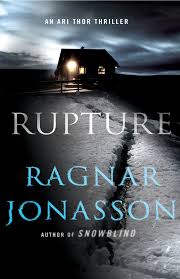 While this series started to come out in Jonasson’s native Iceland in 2015, the books have only now started to make their way stateside, via the UK. Rupture, which Jonasson wrote in 2016, will be published here in January. It’s the third in his “Dark Iceland” series which began with the sensational Snowblind. Let me tell you, whatever publishing path this author took to get here is definitely worth the wait, as he is a phenomenal writer.
While this series started to come out in Jonasson’s native Iceland in 2015, the books have only now started to make their way stateside, via the UK. Rupture, which Jonasson wrote in 2016, will be published here in January. It’s the third in his “Dark Iceland” series which began with the sensational Snowblind. Let me tell you, whatever publishing path this author took to get here is definitely worth the wait, as he is a phenomenal writer.
While I would classify this series as a “traditional detective” series, mostly because of the plot structure, it also has the feel of a contemporary noir. Jonasson embraces both of these strong threads in mysteries equally, and with equal aplomb. His main character is Ari Thor, who began the series as a new detective in tiny Siglufjorour.
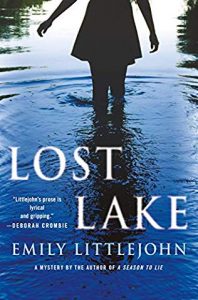 Three books into her series about Detective Gemma Monroe, I am already so smitten that this series belongs alongside favorite series of mine by Sarah Stewart Taylor, Elly Griffiths, Ellen Hart and Julia Spencer-Fleming. All of these writers – including Littlejohn – create a rich setting, and populate their unique settings or occupations with even richer characters and stories. All of them feature extremely strong women as their core characters.
Three books into her series about Detective Gemma Monroe, I am already so smitten that this series belongs alongside favorite series of mine by Sarah Stewart Taylor, Elly Griffiths, Ellen Hart and Julia Spencer-Fleming. All of these writers – including Littlejohn – create a rich setting, and populate their unique settings or occupations with even richer characters and stories. All of them feature extremely strong women as their core characters.

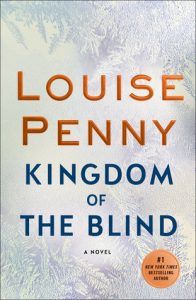
 I read many, many, mysteries, in the neighborhood of two a week, enjoying many of them and loving fewer. When I pick up a novel like this one by Emily Littlejohn, I am forcibly and joyfully reminded of the reasons I love this genre so much. This is simply a wonderful mystery, and even better, it reminded me of another series by another favorite writer of mine, Julia Spencer-Fleming.
I read many, many, mysteries, in the neighborhood of two a week, enjoying many of them and loving fewer. When I pick up a novel like this one by Emily Littlejohn, I am forcibly and joyfully reminded of the reasons I love this genre so much. This is simply a wonderful mystery, and even better, it reminded me of another series by another favorite writer of mine, Julia Spencer-Fleming. With her clear prose and careful gaze, Carrie Smith has quickly become one of my favorite authors. British or American, I love a police procedural, and some of my favorite authors of all time include Lillian O’Donnell, Leslie Glass, Barbara D’Amato, Lynn Hightower and Lee Martin, all authors of the American police procedural. These writers feature a female cop as the central protagonist and from O’Donnell on forward, all have encountered, in their different ways, varieties of sexism and discrimination. Unfortunately, the history line beginning with O’Donnell’s The Phone Calls in 1972 to Carrie Smith’s 2017 Unholy City hasn’t changed all that radically.
With her clear prose and careful gaze, Carrie Smith has quickly become one of my favorite authors. British or American, I love a police procedural, and some of my favorite authors of all time include Lillian O’Donnell, Leslie Glass, Barbara D’Amato, Lynn Hightower and Lee Martin, all authors of the American police procedural. These writers feature a female cop as the central protagonist and from O’Donnell on forward, all have encountered, in their different ways, varieties of sexism and discrimination. Unfortunately, the history line beginning with O’Donnell’s The Phone Calls in 1972 to Carrie Smith’s 2017 Unholy City hasn’t changed all that radically.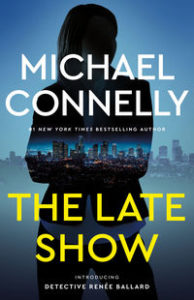 Michael Connelly has seamlessly launched a new character and series, introducing Detective Renee Ballard. Ballard works “The Late Show,” or the overnight shift, and she’s in a bit of purgatory as she’s accused her former boss of sexual harassment. When the charges went nowhere (her old partner didn’t back her up), she was booted to the Late Show, where she catches cases but isn’t able to follow them through to a conclusion. She instead turns them over to the pertinent department – homicide, robbery, etc. She’s feeling the lack of follow-through – she’s not as engaged in her job and her partner, who works the late shift to get home and care for a wife with cancer, doesn’t have the same focus she does.
Michael Connelly has seamlessly launched a new character and series, introducing Detective Renee Ballard. Ballard works “The Late Show,” or the overnight shift, and she’s in a bit of purgatory as she’s accused her former boss of sexual harassment. When the charges went nowhere (her old partner didn’t back her up), she was booted to the Late Show, where she catches cases but isn’t able to follow them through to a conclusion. She instead turns them over to the pertinent department – homicide, robbery, etc. She’s feeling the lack of follow-through – she’s not as engaged in her job and her partner, who works the late shift to get home and care for a wife with cancer, doesn’t have the same focus she does.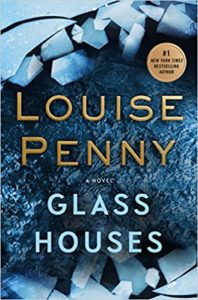 Forget retirement. Gamache is now head of the ENTIRE Surete. After the events of the last novel, Gamache has taken on corruption on a larger scale – he’s literally moved on from the academy to the world at large. Penny, as always, skillfully layers her story. In this outing, she jumps between Gamache’s testimony at a trial, a murder in Three Pines, and the Surete’s – and Gamache’s – fear of the drug crisis, specifically the opioid epidemic and how best to fight it. While Julia Keller’s new book (Fast Falls the Night) also focuses on the opioid epidemic, she goes for the personal; Penny goes for the epic. Keller’s view is far more pessimistic than Penny’s ultimately optimistic one.
Forget retirement. Gamache is now head of the ENTIRE Surete. After the events of the last novel, Gamache has taken on corruption on a larger scale – he’s literally moved on from the academy to the world at large. Penny, as always, skillfully layers her story. In this outing, she jumps between Gamache’s testimony at a trial, a murder in Three Pines, and the Surete’s – and Gamache’s – fear of the drug crisis, specifically the opioid epidemic and how best to fight it. While Julia Keller’s new book (Fast Falls the Night) also focuses on the opioid epidemic, she goes for the personal; Penny goes for the epic. Keller’s view is far more pessimistic than Penny’s ultimately optimistic one. Theresa Schwegel is a brilliant and underappreciated writer (despite an Edgar win for her first novel, Officer Down). She is a difficult writer, though, and refuses to sugarcoat anything. She also writes her novels in first person, present tense, which some people find off-putting. That said, she’s one of the more original and vivid writers in mystery fiction. Everything she writes is memorable and worth a look, and this novel, her sixth, is no exception.
Theresa Schwegel is a brilliant and underappreciated writer (despite an Edgar win for her first novel, Officer Down). She is a difficult writer, though, and refuses to sugarcoat anything. She also writes her novels in first person, present tense, which some people find off-putting. That said, she’s one of the more original and vivid writers in mystery fiction. Everything she writes is memorable and worth a look, and this novel, her sixth, is no exception.